Fuel management 6, Lowrance LMF-400

Lowrance’s LMF-400 is one impressive NMEA 2000 gauge, and I should have included it in my N2K instrument round up. On the above “fuel management” screen it’s totaling the flows of the two FloScan FloNets and calculating nm/gal using boat speed, while also showing the tank level % from a Maretron adaptor. You can easily change the data fields or build a custom screen showing from one to four data types—either virtual needle style or numeric—and thus monitor individual engine flows (good for catching mechanical problems), fuel used by trip or season, remaining fuel, and range. You can also choose data sources, set up your engine/tank configuration, and calibrate Lowrance fluid level and gasoline flow sensors with the LMF-400; it’s quite visible in sunny conditions; and the little devil can be had for about $120, only $40 more with a flow sensor. In short, it does everything you could want in fuel management, inexpensively (see way below for more details).
But the LMF-400 is not just about fuel; it will show all sorts of data from engines (a Lowrance specialty) and other sensors on 13 customizable screen types. And you can have up to 16 such screens in active rotation, a record, I think. It doesn’t do wind yet—come on, Lowrance, even some fishermen are interested—but of all the N2K gauges I’ve tried so far, it and the Maretron DSM are the only ones that can display rudder angle. I’m not sure why the special screen (below) shows the decimal place—no rudder sender is that accurate, is it?—but it’s certainly a sign of what an able gauge this is.
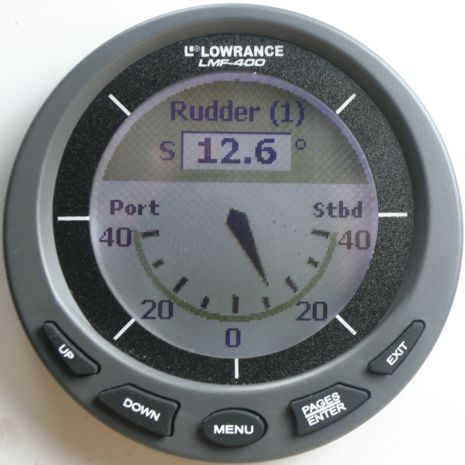
PS. Lowrance fuel management details: I could not at first get the LMF-400/FloNet/Maretron setup to show used and remaining fuel values, or range. It turned out that there were two reasons. One, Lowrance just won’t calculate range based on tank level, figuring that tanks slosh around too much underway for accuracy (particularly true in small boats). Two, Lowrance stores used and remaining fuel values right in its own fuel flow sensor. That’s smart in terms of having the data available and consistent system wide, but didn’t work with the FloNet adaptors. However, Lowrance does make an EP-85R Storage Device that keeps track of flow-based fuel values. Plugging it in to my test network immediately provided the missing fuel data for the FloScan system. You’ll also need this module if you’re getting flow directly from a NMEA 2000 engine, as discussed here.
PPS. Why all the fuss about fuel management?



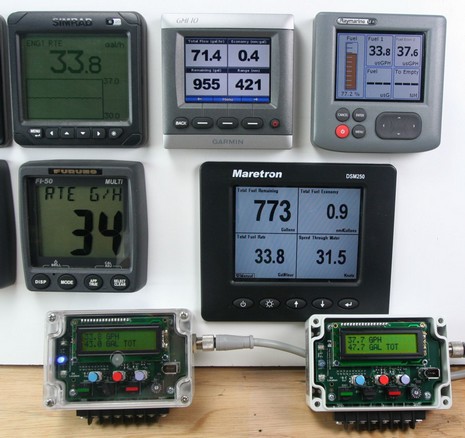
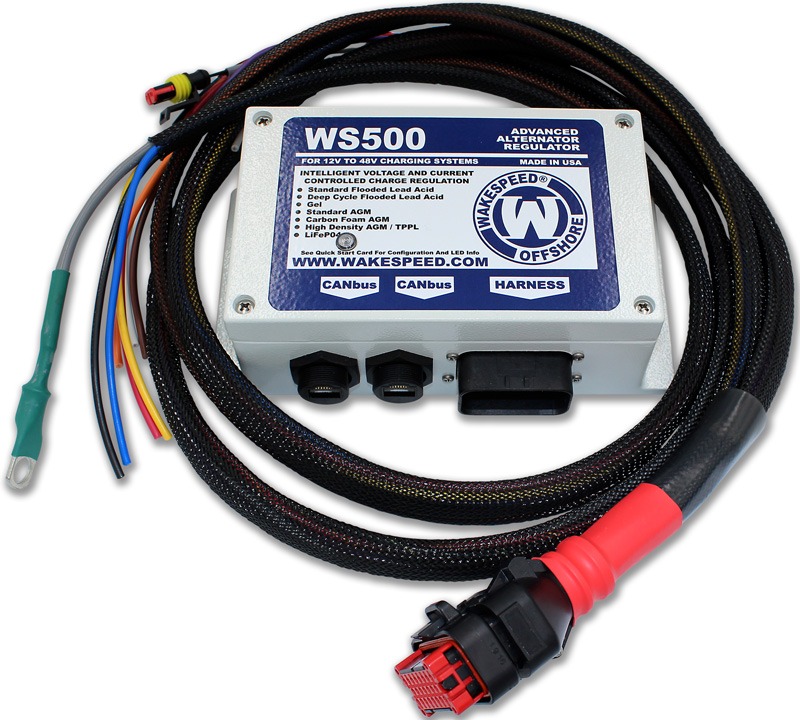
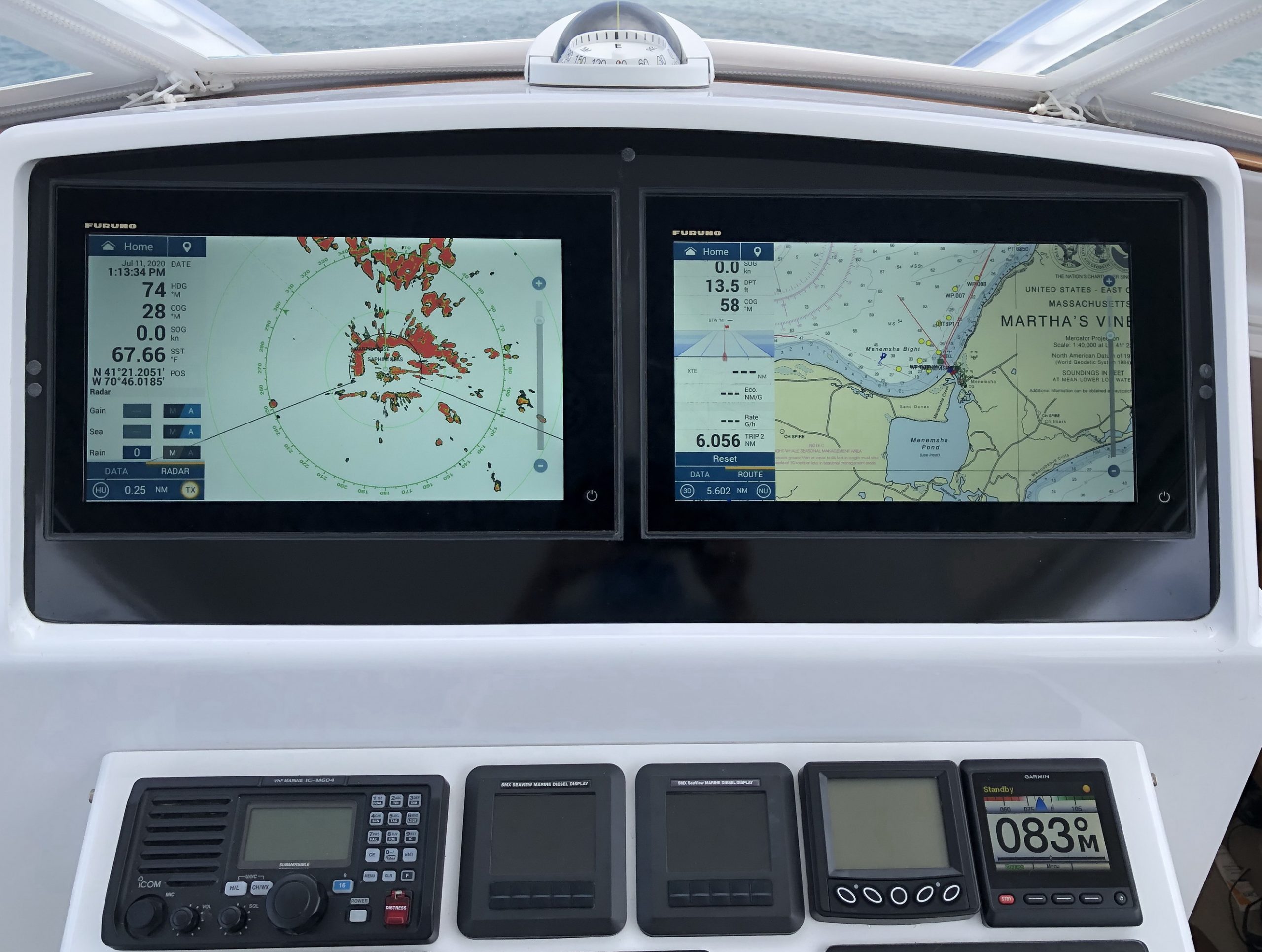
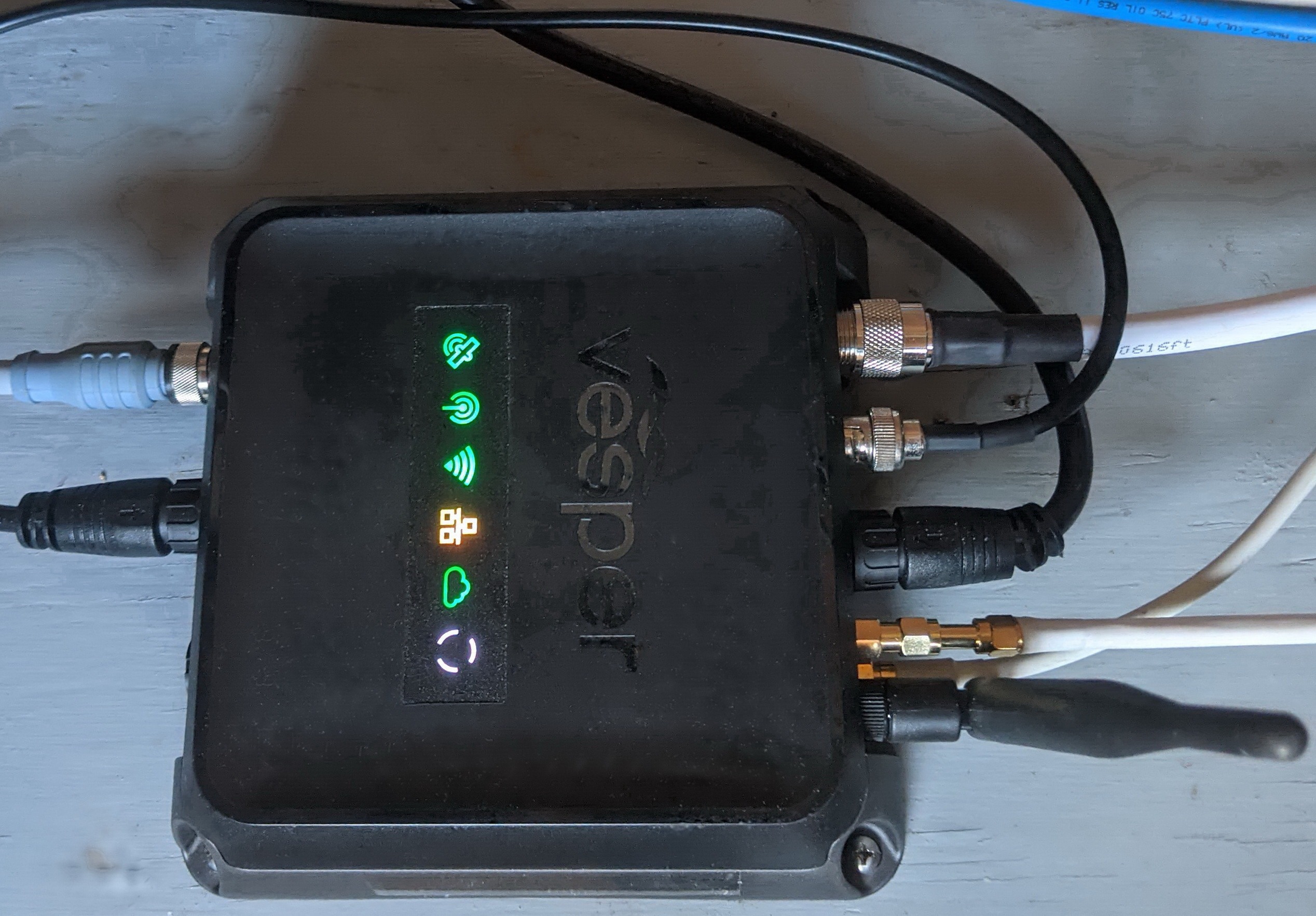







I’m on my third season with an LMF 400. How can
something that costs so little work so well.
Have sense added the lmf 200 (little brother to
the 400) and lots of other nmea 2000 devices.
Cool ! Very sharp looking too.
Well, I should add that some people find the LMF-400 a bit pixelated. They definitely aren’t Garmin GMI or Raymarine ST70 hi res, or Furuno FI-50 crisp, but they are readable in all conditions I’ve seen so far (and I have one mounted on Gizmo now).
I’ve been running this gauge and the included EP-60R fuel flow sensor all summer. It’s an incredibly adaptable, and very low-cost N2K device. Immediately picks up the N2K gps and speed data needed to compute mpg/etc.
As far as remaining fuel, it works fine with only the EP flow device, once the tank was filled and the device reset.
For about $160 for the package, this one’s a winner in my book.
I have an LMF-400, it recieves fuel and engine data from a Volvo diesel NMEA 2000 interface, and speed, depth, and rudder data from a Raymarine C80. It works great. I cannot find the EP-85r storage module you mentioned, so the fuel remaining feature does not work. The module is not listed at the Lowrance web site, nor at any of the on line vendors I have checked.
But does anyone know where I can get such a system for a vessel with:
2 main engines (Rolls Royce 5440 BHP)
2 Caterpillar (3412) generators
1 emergency generator
2 bow thruster engine?
Bonus points if one can be found that doesn’t involve cutting all the fuel lines to add flanges & inline sensors and can also measure flow in the inlet & discharge piping. I’ve been looking at ultrasonic sensors but am sceptical about whether they will work in real life.
Dave
Tony, According to that last link in my entry, Evinrude sells the EP-85R for around $63.00, as part # 763704, a fuel memory Module. More info here, too:
http://tinyurl.com/5q7cos
In the fuel page image, it indicates the Water Speed as being “63.99 N”. The other data fields on that page are labeled using conventional units of measure, “gal/h”, “nm/gal”, but what unit of measure is an “N” ?
You’re right, Mark; the “N” would be better expressed as “nm” or better yet “k”. Lowrance’s to-the-hundreths “precision” is a little odd too, but doesn’t really impair the usefulness of the LMF-400.
FYI, when the shot was taken, I was simulating a water speed of 64 knots so as to get a simple economy value of 1 nm/gal, which was useful for seeing clearly how different displays handled remaining fuel calculations. I have this gauge mounted on my 40hp test skiff now, and am happy to report that the Flow and Economy numbers are significantly better!
Hi!
I have a Lowrance LCX-27C. Can I get the economy readout on that, or do I need a LMF-400 (does it do the calculation?)
Thanks!
Flip,
The sensor, along with the gps antenna, does all
the calculations, and can be displayed on the
LCX 27 screen.
Ok, thank you (I have the lowrance n2k flow sensor) I will look more for the readout. So this would work with any n2k device? (Since the calculation is done in the sensor)
I believe the latest version of the RayMarine C-Series firmware may display rudder angle via NMEA2000 – but only as text, not as a gauge graphic.
Has anyone tried the Lowrance EP-60R sensor with a Garmin 4000 series? Just wondering if you have to have a Lowerance LMF200 or LMF400 head to do calibration or are we finally at the holy grail whereby different devices can work with each other e,g, a lowrance fuel flow sensor with a garmin chartplotter (the lowrance flow sensor is half the price of the garmin sensor).
Hi
Does Lowrance make a probe for diesel engines to allow connection to the LMF-400?
Mwack, You can not set up a Lowrance fuel sensor without either a Lowrance gauge or MFD.
Peter, Lowrance does not make a diesel fuel sensor but the LMF-400 works fine with the FloScan sensors linked to above.
I just installed the LMF400 with fuel flow, level, and paddle wheel sensors. Haven’t had it in the water but testing on the trailer looks good.
However, one of the screens shows voltage can be either battery or alternator.
Mine does not register either. I find no voltage sensors listed in the Lowrance catalog.
I was instructed by Lowr to connect the power to the run of the tee that the LMF is connected to the branch. Since the power is not connected to a separate tee, could that be the reason for not getting a voltage readout?
Thanks, Mike
Anyone have any experience with using a NMEA 0183 to NMEA 2000 converter with the LMF 400? My Garmin 3006C Chartplotter is a NMEA 0183 device and I would like to feed the speed over the ground info to the LMF so it can calculate MPG.
Bill, I’ve tested two 0183-to-2000 translators and am pretty sure that either would do that job for you. Probably the least expensive is the Simrard AT10, which I wrote about here:
https://panbo.com/archives/2008/05/simrad_at10_handy_but_limited.html
Note that you will also need a SimNet tee and a patch cable to get from it to a regular NMEA 2000 male connector.
The Actisense NGW-1 is more expensive but has a regular connector, and also translates more messages in both directions. I don’t know what else is on your NMEA 2000 backbone now, but the NGW-1 will give you more options.
I am considering a LMF 400 for fuel management on a carbeurated Mercruiser. However I would also like to use it to eliminate the tachometer. It appears I will need something to convert the tach signal from analog to digital…? Is there a reasonable and economical way to do this.
I plan to retain the analog temp gauge and I have a Balmar gauge for volts/amps.